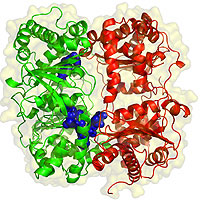Researchers at the Norwegian University of Life Sciences at Aas, Norway, claim to have broken the code for hyper-effective production of biofuels.
The discovery of a whole new type of enzymes may lead to optimized production of biofuels, enabling a switch from the use of food plants to use of less valuable biomaterials, the scientists believe.
The production of biofuels has long been the subject of heated discussion, because much of the current production of bioethanol comes from food plants, such as sugar cane, maize, rapeseed and othercrops that occupy land dedicated to food crops.
This conflict may now be resolved due to the discovery of new enzymes by researchers at the Norwegian University of Life Sciences. With these novel enzymes the decomposition and conversion of other types of biomass – such as straw, forestry waste products and the by-products from food production – to biofuels becomes highly effective.
“Major breakthrough”
“Our research team has discovered a totally new type of enzyme, which helps break down cellulose and other robust sugar polymers in biomaterials, such as chitin, found in prawn shells. We have got this new enzyme to work, which means that enzymatic decomposition goes much faster,” says Researcher Gustav Vaaje-Kolstad.
[ad]
The new enzymes have been provisionally designated as Oxidohydrolases. “The novel enzymes will generally be able to help with the development of new technology for better utilisation of all kinds of plant materials for all purposes in biorefineries,” Vaaje-Kolstad adds.


